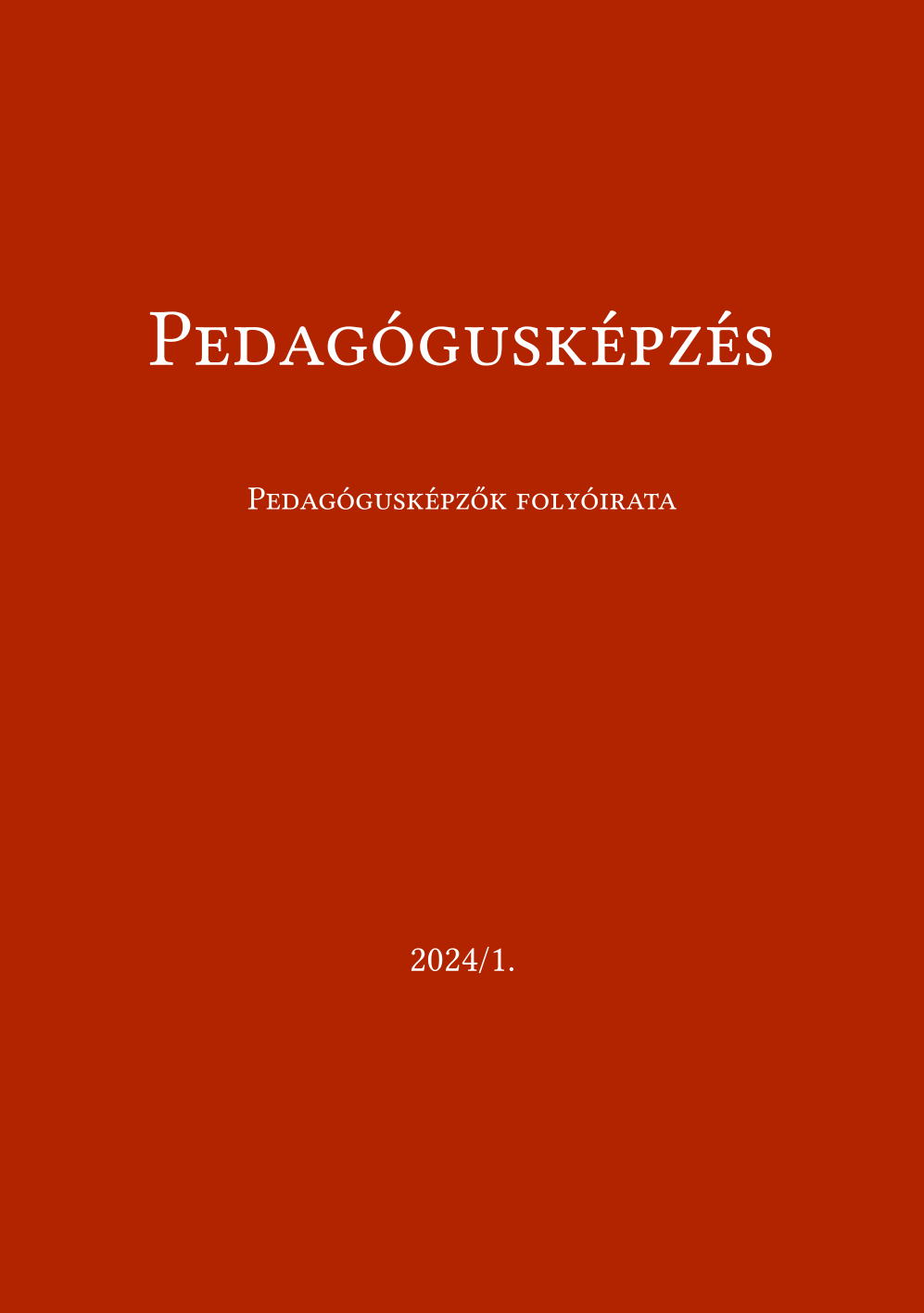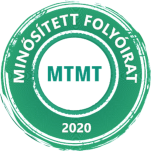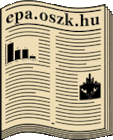Tanárjelöltek szakmai tanulásának és identitáskonstruálásának támogatása – a videotréning lehetőségei a tanárképzésben
DOI:
https://doi.org/10.37205/TEL-hun.2024.1.01Kulcsszavak:
tanárjelöltek, szakmai fejlődés és tanulás, szakmai identitás, videotréning/Video Interaction Guidance (VIG)Absztrakt
Az utóbbi időben a tanári szakmai fejlődés és tanulás fogalmi megközelítései egyre inkább összekapcsolódnak a szakmai identitásfejlődés témájával. Ebből a perspektívából a tanárok szakmai tanulása holisztikusabban, a „Ki vagyok én tanárként?”, „Ki akarok lenni tanárként?” kérdései, önmeghatározása mentén értelmeződik. De milyen konkrét módszerek segíthetik a képzés során a tanárjelöltek iskolai, munkahelyi tanulási folyamatokba ágyazott tanulásának és identitáskonstruálásának együttes támogatását, a tanári működés holisztikusabb értelmezését, melyben a környezet, a szereplők értelmezései, gondolatai és érzelmei is kiemelten megjelenhetnek?
Tanulmányunkban erre keressük a választ. Először a szakmai fejlődés és tanulás fogalmi változását, identitásfogalommal való kapcsolatát és modelljeit elemezzük; majd a videotréning mint fejlesztő-támogató eszköz ebben játszott szerepét, a kapcsolódó kutatások eredményeit vesszük számba a képzésben való alkalmazás nézőpontjából. A témában végzett empirikus kutatásunk részletes eredményeit – a MoTel-program (Models of Teacher Learning) részeként – a Pedagógusképzés folyóirat következő számában adjuk majd közre.
Hivatkozások
Akkerman, S. & Meijer, P. (2011). A dialogical approach to conceptualizing teacher identity. Teaching and Teacher Education, 27(2), 308–319. https://doi.org/10.1016/j.tate.2010.08.013
Ahsan, H. (2009). Video Interaction Guidance (VIG): A Tool for In-School Training to Promote Inclusive Education in Bangladesh. Bangladesh Education Journal, 8(2), 46–52.
Anspal, T., Eisenschmidt, E. & Löfström, E. (2011). Finding myself as a teacher: exploring the shaping of teacher identities throug student teachers’ narratives. Teachers and Teaching: Theory and Practice, 18(2), 197–216. https://doi.org/10.1080/135 4060 2.2012.632268
Beijaard, D., Verloop, N., & Vermunt, J. D. (2000). Teachers’ perceptions of professional identity: An exploratory study from a personal knowledge perspective. Teaching and Teacher Education, 16, 749–764. https://doi.org/10.1016/S0742-051X(00)000 23-8
Beijaard, D., Meijer, C. P. & Verlooop, N. (2004). Reconsidering research on teachers’ professional identity. Teaching and Teacher Education, 20, 107–128. https://doi.org/10.1016/j.tate.2003.07.001
Boylan, M., Coldwell, M., Maxwell, B. & Jordan, J. (2018). Rethinking models of professional learning as tools: a conceptual analysis to inform research and practice. Professional Development in Education, 44(1), 120–139. https://doi.org/10.1080/194 1525 7.2017.1306789
Clandinin, D. J. & Connelly, F. M. (2000). Narrative Inquiry. Experience and story in qualitative research. Jossey-Bass.
Darling-Hammond, L., & Richardson, N. (2009). Teacher learning: What matters? Educational Leadership, 2, 46–53.
Dowrick, P. W., Kim-Rupnow, W. S., Power, T. J. (2006). Video Feed forward for Reading. The Journal of Special Education, 39(4), 194–207. https://doi.org/10.1177/00 2246 69060390 04 0101
Edwards, A. & Mutton, T. (2007). Looking forward: rethinking professional learning through partnership arrangements in Initial Teacher Education. Oxford Review of Education, 33(4), 503–519. https://doi.org/10.1080/03 0549 80701450 92 8
Endacott, J. L. (2016). Using Video-Stimulated Recall to Enhance Preservice- Teacher Reflection. The New Educator, 12(1), 28–47. https://doi.org/10.1080/15 4768 8X.2015.1113351
Feiman-Nemser, S. & Remillard, J. (1996). Perspectives on learning to teach. In Murray, F. B. (Ed.), The teacher educator's handbook (pp. 63–91). Jossey-Bass.
Fernandez, C. & Girotto, J.G. (2013). Following Early Career Chemistry Teachers: The Development of Pedagogical Content Knowledge from Pre-service to a Professional Teacher. Problems of Education in the 21st Century. 3, 56–73.
Flores, M. A. & Day, C. (2006). Contexts which shape and reshape new teachers’ identities: A multi-perspective study. Teaching and Teacher Education, 22, 219–232. https://doi.org/10.1016/j.tate.2005.09.002
Garner, J. K. & Kaplan, A. (2018), A complex dynamic systems perspective on teacher learning and identity formation: an instrumental case. Teachers and Teaching, 25(1), 7–33. https://doi.org/10.1080/135 4060 2.2018.1533811
Geijsel, F. & Meijers, F. (2005). Identity learning: the core process of educational change. Educational Studies, 31(4), 419–430. https://doi.org/10.1080/03 0556 90500237 48 8
Gergely-Gál, Á. (2018). Iskolai Videotréning – a látható változás módszerének alkalmazása a zenetanárok körében. In Újító törekvések: Megújuló művészetpedagógiai jó gyakorlatok értéktára 2. (pp. 48–62). MZMSZ. https://mzmsz.hu/images/csatolmanyok/megujulo_muveszetpedagogia__vetit_final.pdf
Gombás, J. (2018). A videotréning módszer bemutatása, alkalmazásának lehetőségei a pedagógusképzésben. In Karlovitz, J. T. (Ed.), Elmélet és gyakorlat a neveléstudományok és szakmódszertanok köréből (pp. 248–256). International Research Institute.
Grimmett, H., Forgasz, R., Williams, J. & White, S. (2018). Reimagining the role of mentor teachers in professional experience: moving to I as fellow teacher educator. Asia-Pacific Journal of Teacher Education, 46(4), 340–353. https://doi.org/10.1080/13 5986 6X.2018.1437391
Izadinia, M. (2013). A review of research on student teachers’ professional identity. British Educational Research Journal, 39(4), 694–713.
Kagan, D. M. (1992). Professional growth among preservice and beginning teachers. Review of Educational Research, 62(2), 129–169. https://doi.org/10.3102/00 3465 43062002 12 9
Kálmán, O. (2019). A felsőoktatás oktatóinak szakmai fejlődése: az oktatói identitás alakulása és a tanulás módjai. Neveléstudomány: Oktatás – Kutatás – Innováció, 7(1), 74–97. https://doi.org/10.21549/NTNY.25.2019.1.6
Kelchtermans, G. (2004). CPD for professional renewal: moving beyond knowledge for practice. In Day, C. & Sachs, J. (Eds.), International Handbook on the Continuing Professional Development of Teachers (pp. 217–238). Open University Press.
Kelchtermans, G. (2017). Studying Teachers' Lives as an Educational Issue. Teacher Education Quarterly, 44(4), 7–26.
Kennedy, H., Landor, M. & Todd, L. (2015) Video Enhanced Reflective Practice: Professional Development through Attuned Interactions. Jessica Kingsley.
Korthagen, F. A. J. (2004), In search of the essence of a good teacher: towards a more holistic approach in teacher education. Teacher and Teaching Education, 20, 77–97. https://doi.org/10.1016/j.tate.2003.10.002
Korthagen, F. (2017). Inconvenient truths about teacher learning: towards professional development 3.0. Teachers and Teaching: Theory and Practice, 23(4), 387–405. https://doi.org/10.1080/135 4060 2.2016.1211523
Lauriala, A. & Kukkonen, M. (2005). Teacher and student identities as situated cognitions. In Denicolo, P. & Kompf, M. (Eds.), Connecting policy and practice: Challenges for teaching and learning in schools and universities (pp. 199–208). Routledge. https://doi.org/10.4324/97 8020 3012529- 27
Leeferink, H., Koopman, M., Beijaard, D. & L. M. Schellings, G. (2019). Overarching professional identity themes in student teacher workplace learning. Teachers and Teaching, 25(1), 69–89. https://doi.org/10.1080/135 4060 2.2018.1527762
Ligorio, M. B. (2010). Dialogical relationship between identity and learning. Culture and Psychology, 16(1), 93–107. https://doi.org/10.1177/13 5406 7X093 5320 6
MacCallum, L. (2013). A systematic review of school based mentoring interventions and an exploratory study of using Video Interaction Guidance to support peer reading mentors. https://dokumen.tips/documents/a-systematic-review-ofschool-based-mentoring-.html?page=1
Mena, J., Garcia, M., Clarke, A. & Barkatsas, A. (2016). An analysis of three different approaches to student teacher mentoring and their impact on knowledge generation in practicum settings. European Journal of Teacher Education, 1, 53–76. https://doi.org/10.1080/026 1976 8.2015.1011269
Meijer, C. P., Oolbekkink, W. H., Pillen, M. & Aardema, A. (2014). Pedagogies of developing teacher identity. International Teacher Education: Promising Pedagogies (Part A). Advances in Research on Teaching, 22, 293–309. https://doi.org/10.1108/S1479-36 8720 14000002 201 8
Murray, S. (2016). A Literature Review exploring the use of Video Interaction Guidance (VIG) in schools. Attuned interactions, 19(4). https://attunedinteractions.wordpress.com/2017/04/19/a-literature-reviewexploring-the-use-of-video-interaction-guidance-vig-in-schools-murray-s/
Nagy, K. (2020). A mentorok tanulását és folyamatos szakmai fejlődését meghatározó tényezők. Doktori értekezés. ELTE PPK, Neveléstudományi Intézet. https://doktori.hu/index.php?menuid=193&lang=HU&vid=226 36
Péter, P., Szivák, J., Rapos, N., & T. Kárász, J. (2021). A pályakezdő tanárok tanulásának jellemzői. Pedagógusképzés, 20(3), 5–28. https://doi.org/10.37205/TEL-hun.2021.3.01
Putnam, T., & Borko, H. (2000). What do new views of knowledge and thinking have to say about research on teacher learning? Educational Researcher, 29(1),4–15. https://doi.org/10.3102/00 1318 9X0290 0100 4
Rapos, N. & Kopp, E. (2015). A tanárképzés megújítása. ELTE Eötvös Kiadó.
Rapos, N., Bükki, E., Gazdag, E., & Tókos, K. (2020). A pedagógusok folyamatos szakmai fejlődése és tanulása: Fogalmi változások. Neveléstudomány: Oktatás –Kutatás – Innováció, 8(1), 28–45. https://doi.org/10.21549/NTNY.28.2020.1.2
Rapos, N., Tókos, K., Eszes, F., & Nagy, K. (2022). Tanárszakos hallgatók szakmai fejlődését és tanulását meghatározó kontextuális elemek és vizsgálati lehetőségeik. Neveléstudomány: Oktatás – Kutatás – Innováció, 10(1), 53–81. https://doi.org/10.21549/NTNY.36.2022.1.3
Révai, N. & Guerriero, S. (2017). Knowledge dynamics in the teaching profession. In Guerriero, S. (Ed.), Pedagogical knowledge and the changing nature of the teaching profession. Educational Research and Innovation (pp. 171–194). OECD Publishing.
Rodgers, C. R. & Scott, K. H. (2008): The development of the personal self and professional identity in learning to teach. In Cochran-Smith, M., Feiman-Nemser, Sh., McIntyre, D. J. & Demers, K. E. (Eds.), Handbook of research on teacher education: Enduring questions in changing contexts (pp. 732–755). Routledge, Taylor& Francis Group/Association of Teacher Educators.
Sallai, É. (2015). A mentori tevékenység tapasztalatai. In Sallai, É. (Ed.), A pedagógusok gyakornoki rendszerének fejlesztése és értékelése (pp. 45–87). Oktatási Hivatal.
Smagorinsky, P., Cook, L. S., Moore, C., Jackson, A. Y. & Fry, P. G. (2004). Tensions in learning to teach: accommodation and development of a teaching identity. Journal of Teacher Education, 55, 8–24. https://doi.org/10.1177/00 2248 71032600 67
Sutherland, L., Howard, S. & Markauskaite, L. (2010) Professional identity creation: examining the development of beginning preservice teachers’ understanding of their work as teachers. Teaching and Teacher Education, 26, 455–465. https://doi.org/10.1016/j.tate.2009.06.006
Swennen, A., Jones, K. & Volman, M. (2010). Teacher educators: their identities, sub-identities and implications for professional development. Professional Development in Education, 36(1–2), 131–148. https://doi.org/10.1080/19 4152 50903457 89 3
Szarka, E. (2016). Videóval támogatott interakció elemzés – egy esettanulmány bemutatása. In Jávorka, G. (Ed.), Fejlődés és fejlesztés az óvodában: Módszertani ajánlás a kompetencialapú óvodai neveléshez (pp. 1–35). Raabe Klett Kiadó.
Szarka, E. (2024). Tanári készségfejlesztés videotréninggel. Parlando: Zenepedagógiai Folyóirat, 1–22.
Szivák, J., Gazdag, E., & Nagy, K. (2018). Szisztematikus irodalomfeldolgozás a videófelvétellel támogatott felidézést alkalmazó pedagógus-kutatásokról. Neveléstudomány: Oktatás – Kutatás – Innováció, 6(3), 5–18. https://doi.org/10.21549/NTNY.23.2018.3.1
Szivák, J., Gazdag, E., & Nagy, K. (2018). Szisztematikus irodalomfeldolgozás a videófelvétellel támogatott felidézést alkalmazó pedagógus-kutatásokról. Neveléstudomány: Oktatás – Kutatás – Innováció, 6(3), 5–18. https://doi.org/10.21549/NTNY.23.2018.3.1
Thurlings, M., Evers, A. T. & Vermeulen, M. (2015). Toward a model of explaining teachers’ innovative behavior: A literature review. Review of Educational Research, 85(3), 430–471. https://doi.org/10.3102/00 3465 43145579 49
Timperley, H. (2008). Teacher professional learning and development. The International Academy of Education.
Van Eekelen, I. M., Boshuizen, H. P. A. & Vermunt, J. D. (2005). Self-regulation in higher education teacher learning. Higher Education, 50, 447–472. https://doi.org/10.1007/s107 34-004-6362-0
Vikaraman, Sh. S, Mansor, A. N. & Hamzah, M. I. H. (2017). Mentoring and Coaching Practices for Beginner Teachers – A Need for Mentor Coaching Skills Training and Principal’s Support. Creative Education, 8, 156–169. https://doi.org/10.4236/ce.2017.81013
Wenger, E. (1998). Communities of practice: Learning as a social system. Systems Thinker, 9(5), 2–3.
Wideen, M., Smith, J. M & Moon, B. (1998). A critical analysis of the research on learning to teach: making the case for an ecological perspective on inquiry. Review of Educational Research, 68, 130–178. https://doi.org/10.3102/00 3465 43068002 13 0
Zembylas, M. (2003). Emotions and teacher identity: A poststructuralist perspective. Teachers and Teaching: Theory and Practice, 9(3), 213–238. https://doi.org/10.1080/13 5406 0309378
##submission.downloads##
Megjelent
Hogyan kell idézni
Folyóiratszám
Rovat
License
Copyright (c) 2024 A szerző(k)

This work is licensed under a Creative Commons Attribution-NonCommercial-NoDerivatives 4.0 International License.








